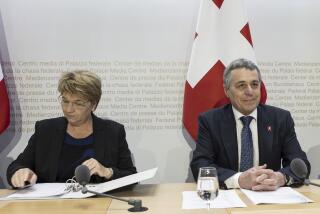Failure to Agree on Rules Stalls Helsinki Conference
- Share via
OTTAWA — East-West disagreements on an agenda delayed the opening Tuesday of an international conference called to review compliance with the Helsinki human rights agreements signed 10 years ago.
The 35-nation meeting, a formal follow-up to the accords reached at the Conference on European Security and Cooperation in the Finnish capital, was scheduled to begin at 10 a.m. with a speech by Joe Clark, Canada’s external affairs minister.
However, in spite of two weeks of preparatory work, by 7:30 a.m. Tuesday the delegates had not reached agreement on the ground rules for the scheduled month and a half of formal sessions, so Clark’s address was postponed.
The formal disagreements dealt with the Soviet-led Eastern Bloc’s refusal to permit any sessions to be open to the press and its insistence that the conference end on June 17. Eastern delegation sources, who declined to be identified, said that there was nothing in the Helsinki agreements that called for review sessions to be open and that the two previous compliance meetings were held in private.
They added that allowing the conference to go on without a definite ending date could lead to empty rhetorical exchanges and little real work.
However, Western delegates said the Soviets really want to avoid any public viewing of a debate that will inevitably focus on complaints about Soviet abuses of human rights.
In fact, these sources say, the Soviets have argued for the past two weeks that there should be no debate at all, that the conference should be limited to each country discussing how it handles its own affairs.
Publicly, Vsevolod Sofinsky, the chief Soviet delegate, would say only that his country will not permit interference with its internal affairs.
No Verbal Cold War
Ambassador Richard Shifter, the head of the U.S. delegation, denied that the West is seeking to embarrass the Soviets or engage in a verbal version of the Cold War. “We’re not on a soap box,” he said. “We only want the facts to speak for themselves.”
The Americans and their allies want to discuss allegations of Soviet restrictions on religious freedom, particularly on Baptists and evangelical sects, anti-Semitism; restraints on ethnic cultures in former Baltic nations occupied during World War II, and use of psychiatry to punish dissidents.
In particular, American delegation sources say they want to bring up 38 individual cases of Soviet citizens being punished for setting up groups to monitor Soviet compliance with the Helsinki accords.
These include Anatoly Shcharansky and Yuri Orlov, whose imprisonments have stirred human rights groups throughout the world.
The conference in Ottawa is a preparatory session for a meeting scheduled in Vienna during November where all aspects of the Helsinki accords are to be reviewed.
More to Read
Sign up for Essential California
The most important California stories and recommendations in your inbox every morning.
You may occasionally receive promotional content from the Los Angeles Times.













